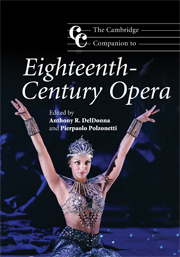Book contents
- Frontmatter
- Part I The making of opera
- Part II National styles and genres
- 9 Genre and form in French opera
- 10 Genre and form in German opera
- 11 Opera in eighteenth-century England: English opera, masques, ballad operas
- 12 Opera in Naples
- 13 Portugal and Brazil
- 14 Opera, genre, and context in Spain and its American colonies
- Notes
- Bibliography
- Index
9 - Genre and form in French opera
from Part II - National styles and genres
Published online by Cambridge University Press: 28 September 2011
- Frontmatter
- Part I The making of opera
- Part II National styles and genres
- 9 Genre and form in French opera
- 10 Genre and form in German opera
- 11 Opera in eighteenth-century England: English opera, masques, ballad operas
- 12 Opera in Naples
- 13 Portugal and Brazil
- 14 Opera, genre, and context in Spain and its American colonies
- Notes
- Bibliography
- Index
Summary
Introduction
Opera in France was a function of the power of the royal court at Versailles, for as long as the court held power. The right to perform a drama sung all the way through, with recitative, was licensed to one single directeur at a time. He, with any business associates, thereby ran the Paris Opéra on behalf of the monarch and to his own material profit. Thus, from 1700 to about 1755, the main strands of French opera remained courtly, whether they were in genres of tragedy, pastoral, or comedy. As the court waned in general influence and respect, alternative forms of opera waxed stronger: opéra comique with new music instead of popular tunes was developed, and in turn institutionalized. Italian opera was, legally, kept at bay. It was forbidden to import its performance, at least without court assent. But by the 1770s the old mold was cracking. Non-French composers brought new styles to French-language opera with recitative (see Tables 9.1–9.3 below). Then the Revolution broke in 1789 and the monarchy was abolished in 1792. All types of opera became freely performable, and several new theaters showed opera and opéra comique alongside performances in the traditional ex-royal institutions. Yet the traditions of French genres remained intact, even an expression of national pride, ensuring their survival and continuing international circulation into the nineteenth century.
- Type
- Chapter
- Information
- The Cambridge Companion to Eighteenth-Century Opera , pp. 153 - 183Publisher: Cambridge University PressPrint publication year: 2009



